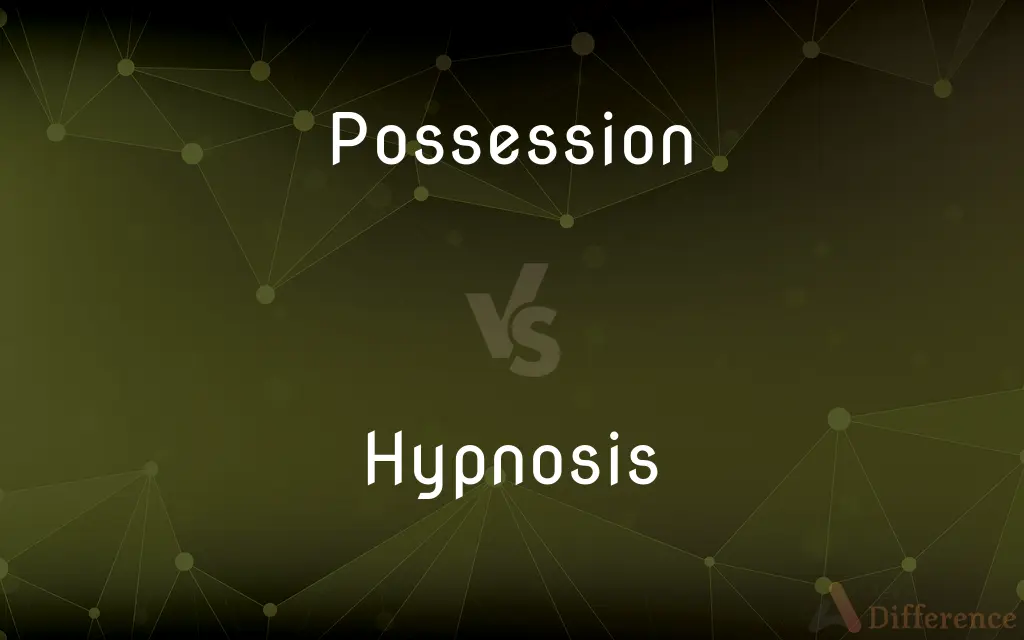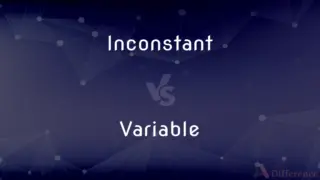Possession vs. Hypnosis — What's the Difference?
By Maham Liaqat & Fiza Rafique — Updated on April 25, 2024
Possession refers to a supernatural phenomenon where a spirit or entity takes control of a person, with spiritual or paranormal implications, while hypnosis is a psychological technique used to induce a trance state in which a person is open to suggest.

Difference Between Possession and Hypnosis
Table of Contents
ADVERTISEMENT
Key Differences
Possession is often described in religious or spiritual contexts as the control of a human body by a supernatural entity, which might manifest through abnormal behavior and speech. Hypnosis, on the other hand, is a scientifically recognized practice where a therapist guides someone into a deeply focused and suggestible state for therapeutic purposes.
While possession is typically involuntary and considered unwanted or harmful, hypnosis is a voluntary process initiated for specific beneficial outcomes such as treatment for phobias, anxiety, or addiction. It requires the subject's consent and awareness of the purpose.
The techniques involved in possession are not scientifically validated and often include rituals or exorcisms performed by spiritual leaders. Conversely, hypnosis involves techniques like guided relaxation, intense concentration, and the use of repeated phrases or suggestions, which are studied and employed by mental health professionals.
In cultural portrayal, possession is often associated with horror or supernatural films and literature, evoking fear and mystery. Hypnosis, however, is depicted in both clinical settings and entertainment, sometimes inaccurately portrayed as mind control.
The beliefs surrounding possession vary greatly across different cultures and religions, some viewing it as a form of punishment or a test of faith. Hypnosis is universally recognized in the field of psychology and is used across various cultural settings primarily for its therapeutic benefits.
ADVERTISEMENT
Comparison Chart
Definition
Supernatural control of a person by an entity
Psychological technique inducing a trance state
Voluntariness
Involuntary and unwanted
Voluntary and therapeutic
Techniques
Spiritual rituals, exorcisms
Guided relaxation, concentration, suggestion
Purpose
Often viewed as harmful
Therapeutic, help with various mental issues
Cultural portrayal
Horror, supernatural themes
Clinical and entertainment, often as mind control
Compare with Definitions
Possession
Typically requires rituals or spiritual intervention.
The exorcism was performed to cleanse the possession.
Hypnosis
A technique to achieve a heightened state of concentration and suggestibility.
The therapist used hypnosis to help her patient overcome smoking.
Possession
The state of being controlled by a supernatural entity or spirit.
The novel depicted a terrifying case of demonic possession.
Hypnosis
Involves voluntary participation and focused attention.
During the session, hypnosis was induced through guided imagery.
Possession
Can signify spiritual warfare in many religions.
Possession stories are common in cultures with strong spiritual beliefs.
Hypnosis
Utilized for therapeutic benefits in various psychological treatments.
Hypnosis has proven effective in treating certain anxiety disorders.
Possession
Often associated with paranormal activity.
The family called a priest to address the suspected possession.
Hypnosis
Can be used for performance enhancement and skill learning.
Athletes sometimes use hypnosis for mental training.
Possession
Viewed differently across various cultures and religions.
In some traditions, possession is seen as a form of divine communication.
Hypnosis
Misrepresented in media as a form of mind control.
Movies often exaggerate hypnosis as a tool for manipulation.
Possession
The act or fact of possessing.
Hypnosis
Hypnosis is a human condition involving focused attention (the selective attention/selective inattention hypothesis, SASI), reduced peripheral awareness, and an enhanced capacity to respond to suggestion.There are competing theories explaining hypnosis and related phenomena. Altered state theories see hypnosis as an altered state of mind or trance, marked by a level of awareness different from the ordinary state of consciousness.
Possession
The state of being possessed
The land's possession by the town.
Hypnosis
An artificially induced altered state of consciousness, characterized by heightened suggestibility and receptivity to direction.
Possession
Something owned or possessed
Removed his possessions from the desk.
Hypnosis
Hypnotism.
Possession
A territory subject to foreign control.
Hypnosis
A sleeplike condition.
Possession
Power or control over something
Possession of a firearm.
Hypnosis
A trancelike state, artificially induced, in which a person has a heightened suggestibility, and in which suppressed memories may be experienced.
Possession
Occupation or control of a piece of property, with or without ownership.
Hypnosis
Any of various sleep-like conditions.
Possession
A right of occupation and use
The tenant has possession of the apartment until the end of the lease.
Hypnosis
The art or skill of hypnotism.
Possession
The crime of possessing an illegal drug.
Hypnosis
Supervention of sleep.
Possession
The state of being dominated or controlled by a demon or spirit.
Hypnosis
The condition of being hypnotized or the process of hypnotizing a person; hypnotism{1}.
Possession
The state of being occupied or obsessed with something, such as an idea.
Hypnosis
A state that resembles sleep but that is induced by suggestion
Possession
Physical control of the ball or puck by a player or team.
Possession
An instance of this
Ideally, we would score on each possession.
Possession
Control or occupancy of something for which one does not necessarily have private property rights.
Possession
Something that is owned.
The car quickly became his most prized possession.
I would gladly give all of my worldly possessions just to be able to do that.
Possession
Ownership; taking, holding, keeping something as one's own.
The car is in my possession.
I'm in possession of the car.
Possession
A territory under the rule of another country.
Réunion is the largest of France's overseas possessions.
Possession
The condition or affliction of being possessed by a demon or other supernatural entity.
Back then, people with psychiatric disorders were sometimes thought to be victims of demonic possession.
Possession
The condition of being under the control of strong emotion or madness.
Possession
(sports) Control of the ball; the opportunity to be on the offensive.
The scoreboard shows a little football symbol next to the name of the team that has possession.
Possession
(Australian rules football) A disposal of the ball during a game, i.e. a kick or a handball.
Possession
(linguistics) A syntactic relationship between two nouns or nominals that may be used to indicate ownership.
Some languages distinguish between a construction like 'my car', which shows alienable possession — the car could become someone else's — and one like 'my foot', which has inalienable possession — my foot will always be mine.
Possession
(obsolete) To invest with property.
Possession
The act or state of possessing, or holding as one's own.
Possession
The having, holding, or detention of property in one's power or command; actual seizin or occupancy; ownership, whether rightful or wrongful.
Possession
The thing possessed; that which any one occupies, owns, or controls; in the plural, property in the aggregate; wealth; dominion; as, foreign possessions.
When the young man heard that saying, he went away sorrowful, for he had great possessions.
Ananias, with Sapphira his wife, sold a possession.
The house of Jacob shall possess their possessions.
Possession
The state of being possessed or controlled, as by an evil spirit, or violent passions; madness; frenzy; as, demoniacal possession.
How long hath this possession held the man?
Possession
To invest with property.
Possession
The act of having and controlling property
Possession
Anything owned or possessed
Possession
Being controlled by passion or the supernatural
Possession
A mania restricted to one thing or idea
Possession
A territory that is controllled by a ruling state
Possession
The trait of resolutely controlling your own behavior
Possession
(sport) the act of controlling the ball (or puck);
They took possession of the ball on their own goal line
Common Curiosities
Can anyone be hypnotized?
Most people can be hypnotized to some degree, but responsiveness varies.
Is it possible to be possessed without knowing?
In cultural contexts that believe in possession, it is sometimes suggested that individuals may be unaware until significant symptoms manifest.
Are there scientific studies supporting hypnosis?
Yes, numerous studies validate the efficacy of hypnosis in treating various conditions, including pain management and anxiety.
What is the main difference between possession and hypnosis?
Possession is a supernatural phenomenon, whereas hypnosis is a psychological technique with therapeutic uses.
Is possession recognized in medical literature?
No, possession is not recognized as a medical or psychological condition; it is viewed through spiritual or cultural lenses.
What can trigger a possession according to beliefs?
Triggers can include spiritual vulnerability, moral lapses, or being in a place considered haunted, depending on the belief system.
How is possession treated?
Treatment typically involves spiritual or religious rituals, such as exorcisms, depending on the cultural context.
Can hypnosis be self-induced?
Yes, self-hypnosis is a technique that individuals can learn to induce relaxation or improve focus.
Can possession have psychological explanations?
Some psychologists interpret reports of possession through the lens of mental health disorders, but these are culturally sensitive interpretations.
What are the risks of hypnosis?
Hypnosis is generally safe when practiced by a qualified professional, but improper use can lead to false memories or emotional distress.
What are common misconceptions about hypnosis?
Common misconceptions include the belief that hypnosis can force people to act against their will or reveal personal secrets.
How does one become a hypnotist?
Becoming a hypnotist typically requires specific training and certification in hypnotherapy, governed by professional standards and regulations.
What techniques are used in hypnosis?
Techniques include relaxation, focused attention, and the use of verbal cues and repetition to induce a trance state.
How is hypnosis portrayed in popular culture?
It is often shown as a tool for dramatic mind control, though this portrayal is not accurate.
What should one do if they believe they are possessed?
Those believing in possession often seek help from spiritual leaders or religious figures skilled in dealing with such situations.
Share Your Discovery
Previous Comparison
Iconic vs. Ironic
Next Comparison
Inconstant vs. VariableAuthor Spotlight
Written by
Maham LiaqatCo-written by
Fiza RafiqueFiza Rafique is a skilled content writer at AskDifference.com, where she meticulously refines and enhances written pieces. Drawing from her vast editorial expertise, Fiza ensures clarity, accuracy, and precision in every article. Passionate about language, she continually seeks to elevate the quality of content for readers worldwide.
















































